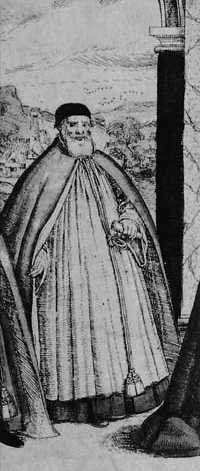Robert Horne (bishop) facts for kids
Quick facts for kids The Right Reverend Robert Horne |
|
|---|---|
| Bishop of Winchester | |

Engraving of Robert Horne in 1576
|
|
| Church | Church of England |
| Diocese | Diocese of Winchester |
| Enthroned | 1560 |
| Reign ended | 1579 (death) |
| Predecessor | John White |
| Successor | John Watson |
| Orders | |
| Consecration | 1560 |
| Personal details | |
| Born | c 1510 Guildford, County Surrey |
| Died | 1579 |
| Nationality | English |
| Denomination | Anglican |
| Occupation | previously Dean of Durham |
| Alma mater | St John's College, Cambridge |
Robert Horne (born around 1510, died 1579) was an important English church leader. He was a strong supporter of the Protestant faith, which was a new way of practicing Christianity at the time. He became the Bishop of Winchester from 1560 until his death.
Contents
Robert Horne: A Church Leader
Robert Horne was born in the 1510s. He grew up to become a very influential person in the Church of England. He was known for wanting to make big changes to the church.
Early Life and Education
Robert Horne studied at St John's College, Cambridge. He became a Fellow there in 1537. A Fellow is like a senior member of the college.
Dean of Durham Cathedral
From 1551 to 1553, Robert Horne was the Dean of Durham. The Dean is a very important leader in a cathedral. He was in charge of Durham Cathedral. During this time, he worked to remove decorations from the cathedral. He wanted the church to be simpler.
However, many people did not agree with his ideas. He found it hard to get support for his changes. He was quite alone in his efforts.
When the Dean of Durham died in 1551, Robert Horne, who was a very strong Protestant, was chosen to take his place. But only one other leader in the church had been replaced with someone who shared his views. This meant Horne had very little help from others in the church. He could only make small changes, and this made him very unpopular. When Queen Mary came to power, many people in the church were happy. Horne had to leave England, feeling sad that his plans had not worked out.
Time in Exile
When Queen Mary I became queen, she was a Catholic. She did not support the Protestant changes. Many Protestants, including Robert Horne, had to leave England. They are known as the Marian exiles.
Horne lived in cities like Zurich, Frankfurt, and Strasbourg. While he was away, he continued his work. He even wrote extra parts for a book of sermons by Jean Calvin. Sermons are religious speeches.
Return and Bishop of Winchester
When Queen Elizabeth I became queen in 1558, she was a Protestant. Robert Horne could return to England. In 1559, he worked with other important church leaders. They helped Queen Elizabeth make new rules for the church. These rules were called the Injunctions.
In 1560, Robert Horne became the Bishop of Winchester. This was a very high position in the church. He served as Bishop until his death in 1579.
Important Church Work
Robert Horne was involved in important discussions about the church. He wrote about the history of the Papacy, which is the system of the Pope and the Catholic Church.
He also helped translate the Bible into English. This new version was called the Bishops' Bible. It was published in 1568. Robert Horne was responsible for translating three books from the Old Testament: the Book of Isaiah, Book of Jeremiah, and Book of Lamentations. This was a huge task. It helped more people read and understand the Bible in their own language.
 | Victor J. Glover |
 | Yvonne Cagle |
 | Jeanette Epps |
 | Bernard A. Harris Jr. |

